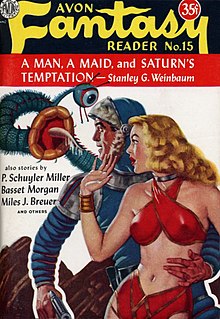Bug-eyed monster

BEM, cover, Avon Fantasy Reader, 1951
The bug-eyed monster (BEM) is an early convention of the science fiction genre.[1] Extraterrestrials in science fiction of the 1930s were often described (or pictured on covers of pulp magazines) as grotesque creatures with huge, oversized or compound eyes and a lust for women, blood or general destruction.
In the contactee/abductee mythology, which grew up quickly beginning in 1952, the blond, blue-eyed, and friendly Nordic aliens of the 1950s were quickly replaced by small, unfriendly bug-eyed creatures, closely matching in many respects the pulp cover clichés of the 1930s which have remained the abductor norm since the 1960s.
Popular culture[]
- The Daleks from Doctor Who. When the show was created, the BBC producers stated that Doctor Who would be a "hard" science fiction show, and there would be no bug-eyed monsters – explicitly stated by show creator Sydney Newman. Writer Terry Nation created the Daleks in the show's second serial, much to Newman's disapproval.[2]
- The main character in the animated children's television series Invader Zim is a bug-eyed monster.[citation needed]
- The Pokémon species "Beheeyem" is based on the concept of bug-eyed monsters in its design, characteristics, and name.[citation needed]
See also[]
References[]
- ^ Urbanski, Heather (2007). Plagues, Apocalypses and Bug-Eyed Monsters: How Speculative Fiction Shows Us Our Nightmares. McFarland. pp. 149–168 and passim. ISBN 978-0-7864-2916-5.
- ^ BBC – Doctor Who – A Brief History of the Daleks URL accessed April 26, 2007
Categories:
- Stock characters
- Extraterrestrial life in popular culture
